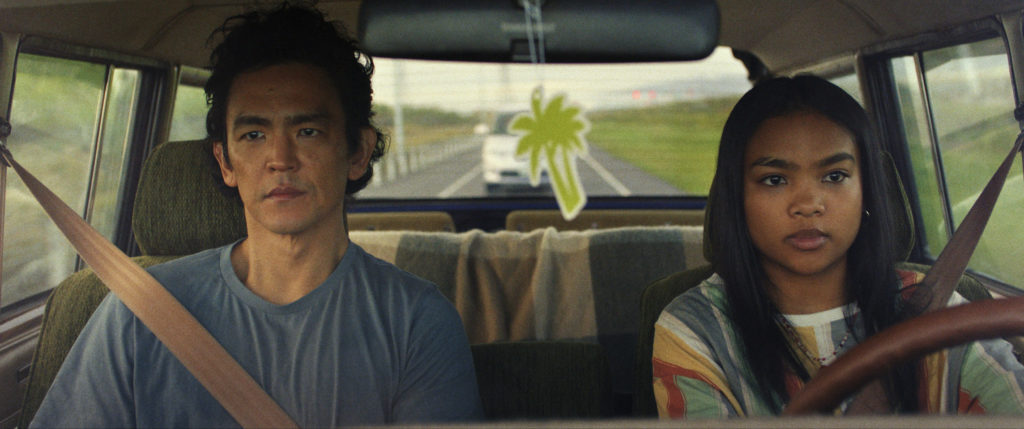Don’t Make Me Go: The real tragedy in this film is the lost potential

By Diana Beechener
After being diagnosed with a rare brain tumor, Max (John Cho: Cowboy BeeBop) goes into a bit of a tailspin. His odds aren’t good and he has to choose between a year to live and a risky surgery with a 20 percent survival rate.
Complicating matters is his daughter, Wally (Mia Isaac in her feature debut), who is about to turn 16. Max has been her only family since his wife abandoned them. Wally has hit a rebellious phase and Max is terrified what losing another parent will do to her.
So, like all movie fathers faced with bleak news, Max announces a road trip. He and Wally will drive from California to Louisiana to attend his college reunion. It’s a flimsy excuse, and Wally isn’t too thrilled with the idea, but Max has an ulterior motive. He’s hoping to find his long-gone ex-wife at the reunion and reunite her with Wally, so that his daughter has someone to rely upon when he dies.
Can Max’s harebrained scheme work? And just how many road movie cliches can we fit in one movie?
If you sign up for a movie like this, you’re probably signing up to cry. Movies like Beaches and The Fault in Our Stars offer a lovely emotional catharsis for viewers. Unfortunately, this is a weepy movie that leaves you feeling hollow and annoyed, but with a runny nose.
Don’t Make Me Go is one of those rare movies that will make you cry, and then make you feel annoyed about it, because it clearly isn’t worth your tears. As a member of the Dead Dad Club, I knew going into this movie that I needed a pack of tissues nearby. What I didn’t expect was to feel so annoyed by the film that I wanted to recant my tears as wasted on such a hollow exercise.
Director Hannah Marks, who made a name for herself with the subversive After Everything, is spinning her wheels with this impotent film. For a movie about death, the stakes feel incredibly low because the characters are so flat. It’s an odd mixture of low-energy filmmaking with high drama writing.
While Don’t Make Me Go could have been a by-the-numbers road trip film, it decides to add a twist. Narratively the twist comes directly from Screenwriting 101, where writers learn that an idea out of left field can shake up an otherwise rote movie. But the twist here is so downright silly that it buries any good will it may have earned.
Writer Vera Herbert, who clearly honed her skills writing emotionally manipulative trash while working on This Is Us, takes every easy path she could manage, ticking off cliches like she’s packing for a particularly uninspired trip. Dying Dad? Check. Snarky teen? Check.? Driving lessons as metaphor for life? Check. Insipid twist that’s meant to change everything? You get the idea.
With a script cobbled together from cliches and undercooked plot elements, it’s really up to the leads to sell a load of nonsense. Luckily for Don’t Make Me Go, John Cho is using every ounce of his considerable charm to make this flick tolerable. And really, it’s Cho’s charisma that makes Max seem like a person. He’s saddled with clunky dialogue and absolutely insane decision making at every turn.
Isaac, who is a lovely screen presence, fares slightly worse with her role. Wally is given nothing to do but act snide, scoff and pout—even when faced with devastating news. Her reaction to finding out her father is dying is similar to her reaction to finding out her sort-of boyfriend is hanging out with his ex. It’s a baffling characterization that Isaac has to push through.
The true tragedy of this movie is that Isaac and Cho have great chemistry together. When they’re left alone by the writer and director, the duo have some sweet, genuine moments. But a few smiles exchanged during a car ride are not a full movie, just as one big plot twist can’t save an already wasted effort. If you’re looking for a cathartic cry movie this weekend, I’d suggest streaming Homeward Bound: The Incredible Journey—the pets have more complex interiority than any of the people in Don’t Make Me Go.
Don’t Make Me Go streams on Amazon Prime beginning July 15.
Poor Drama * R * 109 mins.
